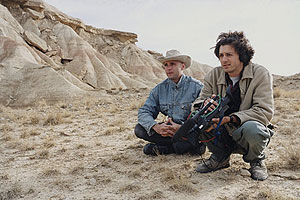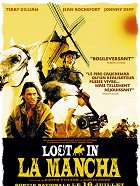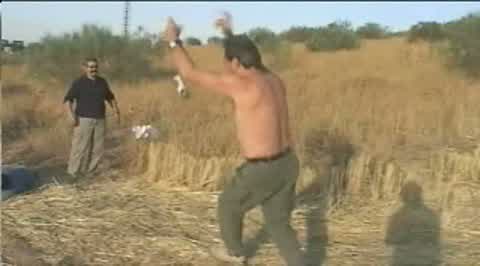Operatőr:
Louis PepeZeneszerző:
Miriam CutlerSzereplők:
Tony Grisoni, Terry Gilliam, Jean Rochefort, Johnny Depp, Vanessa Paradis, Christopher Eccleston, Bill Paterson, Miranda Richardson, Nicola Pecorini (több)Tartalmak(1)
Directed by Keith Fulton and Louis Pepe, LOST IN LA MANCHA documents Terry Gilliam's disaster-prone attempt to make THE MAN WHO KILLED DON QUIXOTE, a film largely based on the classic novel by Miguel de Cervantes. The movie first encounters difficulties in its preproduction stage, starting with an uncomfortably small European-funded budget. Then Gilliam must wait for the lead actors, Johnny Depp and French actor Jean Rochefort, to show up on location in Spain. When Depp and Rochefort finally arrive, shooting commences, but within the first few days a torrential rainstorm hits the set, washing away much of the equipment and significantly altering the dry desert landscape. And to make matters much worse, Rochefort, who plays the central role of Don Quixote, falls ill and returns to Paris for medical treatment. As the days of the Quixote-less production go by, tensions among the crew members increase and Gilliam faces the frustratingly real prospect of scrapping the film. LOST IN LA MANCHA provides a fascinating look into both the mind and the method of maverick director Terry Gilliam. No stranger to film production problems (most notably with BRAZIL and THE ADVENTURES OF BARON MUNCHAUSEN), Gilliam sets out to make DON QUIXOTE with imagination and determination that echoes the noble delusions of its title character. As in the story, however, fantasy finds a fierce opponent in the form of reality, and Gilliam and his crew must decide what to do with a production that seemed jinxed from the start. The fly-on-the-wall footage, candidly captured by Fulton and Pepe, makes for an intriguing film within a film that combines behind-the-scenes frustration and heartbreak with genuinely funny moments. (forgalmazó hivatalos szövege)
(több)Videók (1)
Recenziók (5)
Terrible. A certain amount of uncertainty and doubt can be observed in Gilliam's filmmaking in almost every film he makes... but this quixotic sequence of hardship surpasses every imaginable windmill to contend with. A film that became a reality... Sensitively shot, gripping...
()
It’s a mix of fascination with sadness. Fascination with an extremely creative personality, as Gilliam undoubtedly is, a filmmaker who is always several steps ahead thanks to his imagination. Fascination with the fierce struggle against adversity, the mediocrity of a world that does not understand him and the producer's mistakes. A struggle that, given the predetermined outcome, may resemble Don Quixote's foolish confrontation with the windmills. And the sadness? This stems from the fact that rich imagination full of fantasy can go to waste with the author losing a lot of energy and time in a futile and useless struggle that cannot be won. Filmmaking is a trade, and Don Quixote is probably a cursed material that has already broken many filmmakers.
()
Terry Gilliam tilting at windmills. It is incredible what can happen on set in the course of one week. The leading actor falling ill is just the tip of the iceberg in a series of disasters. This is possibly the only completely honest documentary about a movie that was never made. Proof that Gilliam is a genius visionary, but a bad manager - which is most painfully clear in the scene where he can’t pluck up the courage to come out with the unpleasant truth in front of the crew. The beginning of the end of Don Quixote was evident in the non-existent pre-production. Just a couple of days before filming was meant to begin, contracts still remained to be signed, equipment to be bought and nobody knew what precisely they were going to do. I understand that directors normally have people to organize all that, but here Gilliam concentrates only on his dream and won’t admit even to himself that he has serious problems. A hugely fascinating, yet sad documentary that at first was meant to be “The Making of The Man Who Killed Don Quixote", but as time went on it becomes incredibly revealing insight.
()
A documentary that leaves you feeling incredibly of powerless and hopeless. Financially underestimated projects always have problems and The Man who Killed Don Quixote was a movie hounded by budget compromises from the very start. The few scenes that they were able to film look very promising and watching them with retrospect with the director is mentally painful. After the flood a bad taste of mud, exhaustion remains and you are left at the mercy of the claims adjuster. All of these feelings endure even with the knowledge that Gilliam managed to get his screenplay back and a new version of the movie is playing in some theaters right now.
()
In the “Gilliamesque" memoir, Terry Gilliam writes: “What the camera didn't capture was buzzards. They were circling over our heads waiting for us to die." When I saw Lost in La Mancha for the first time ages ago, I still didn't know much about Gilliam, and I had no idea how (difficult) his other films were to make, but still the result impressed me. Today, now that I'm more familiar with them, plus the day before I see a film that finally came into existence, this disaster documentary is even more impressive. It's a shame it all went so horribly wrong back then, mainly because of Jean Rochefort, but there’s nothing that can be done about that. The windmills simply won for once.
()
Galéria (12)
Photo © 2002 IFC Films



Hirdetés